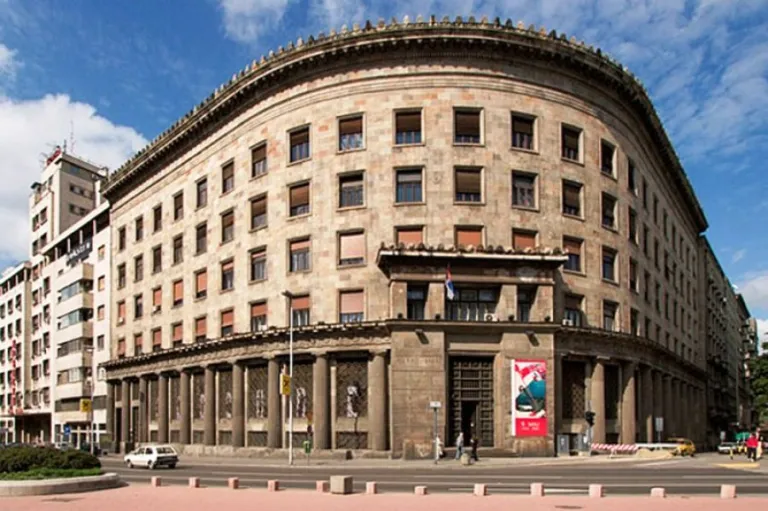
The Institute of European Studies (IES) is a scientific research organization funded by the Government of the Republic of Serbia, located in Belgrade. The research and scientific work of the Institute covers various fields of social sciences: political science, sociology, philosophy, history, law and theology.
IES is composed of a number of experts in these fields, who publish notable scientific and professional papers in a number of world languages - English, Spanish, Russian, French, Turkish, Swedish, Italian, Arabic, Farsi, etc. IES experts are recognizable for their quality work and often appear in media, where they offer expert analyses, thus contributing to the science-based popularization of the areas they deal with in their research. The constant media interest in the events organized by IES speaks of the Institute’s prominence in the country, the region and abroad. IES also has long-term cooperation with the most prominent institutions operating in the country and abroad, such as the Ministry of Education, Science and Technology, the Ministry of European Integration, Matica Srpska, the Open Society Fund, the Gorchakov Fund, the Konrad Adenauer Foundation, the Hans Seidel Foundation, etc.
The Institute, independently and in cooperation with other organizations, is also engaged in publishing important works by domestic and foreign authors in the fields of political science, philosophy, history, law, theology, etc. Special mention should be made of the following editions: Uroš Ćemalović, Intellectual Property Law and Digital Transformation – Some Current Issues (2019); Freemasonry in Southeast Europe from the 19th to the 21st centuries, ed. S. G. Markovich (2020); Stevan Gajić, From Slave to Citizen: The Struggle of African Americans for the Recognition of their Rights (2020); Darko Tanasković, Pure Turkish (2021); Kajica Milanov, Titoism in Yugoslavia (2021); Yoram Hazony, The Virtue of Nationalism – Serbian Language Edition (2021). IES has also cooperated with the University of Business Academy of Novi Sad in co-publishing the renowned journal Kultura polisa, while SRES – Serbian Review of European Studies is in the process of being prepared for publication, as an interdisciplinary, peer-reviewed journal dealing with European studies, reflecting the long-term research orientation of IES.
IES has taken part in numerous scientific projects. The Institute is currently taking part in the CTES Project (Cultural Transfer Europe – Serbia from 19th till the 21st Century) within the IDEA program, in cooperation with the Faculty of Political Sciences, Faculty of Philology, Balkan Institute of SANU and the Institute for Contemporary History, with the support of the Science Fund of the Republic of Serbia and the World Bank. The Institute also participated in the following projects: Serbia in the Process of European Integration: Global Context, Institutions, Identity, Perspectives of the European Framework of Serbia, Accelerated Accession to the European Union – A Prerequisite for Successful Transition and Development of Serbia, Europe and Yugoslavia: Problems of Integration, Modernization and Transition.
For many years, IES has been a place of public debate, seminars, conferences and round tables on various topics, with renowned domestic and international guests. IES seminars are recognized by the wider scientific and academic public as a place where the most diverse opinions can be heard and as a place which exudes freedom of scientific speech and thought. A wide range of topics on which IES has organized public gatherings include: international politics (Russia, EU, Turkey, Middle East, Latin America, India, etc.), history, law (family law, labor law, etc.), contemporary philosophical issues, but also topics related to popular culture. This speaks of a high degree of multidisciplinary that IES nurtures. The following seminars drew large academia and media attention: Religion and Social Processes in Southeast Europe, Balkans and Turkey in Transition, Illiberal Politics in the Western Balkans, Serbia’s Security Cooperation with Bulgaria, Greece and Romania in the European Integration Context, Freemasonry in Southeast Europe from 19. to the 21st century, the European Union and the Western Balkans after Brexit, The Role of Secret Services in Modern Democracies, European Elections and the Future of the European Union.
IES also has a very extensive cooperation with the Association of Spanish Language Teachers of Serbia and the Ibero-American Center of the University of Novi Sad, together with which it has been organizing the International Summer School of Latin American Studies for the past six years, dealing with economic, historical, literary, sociological and identity themes.
In the previous period, IES hosted a large number of renowned foreign authors, such as Max Otte, Wolfgang Schmale, Wolfram Kaiser, Mark Jongen, David Lloyd Dusenbury, Noel O’Sullivan, Michael Freeden, Philip Hammond, James Jatras, Thomas Peak, Gleden Pepin, Elena Ponomareva, Andrei Fursov, Umberto Galimberti, Umut Uzer, Chagri Erhan and Kai Michael Kenkel. In addition to the mentioned authors, IES was visited by numerous guests from the field of diplomacy, such as the ambassadors of Argentina, Armenia, Ukraine, France, Turkey, Iran, Germany, etc. Finally, IES associates also collaborated with numerous universities around the world, making many study visits and implementing numerous scientific projects. The following institutions should be mentioned: Macquarie University in Sydney, University of Bergen in Norway, Department of Theory of International Relations, 21st Century University Centre and Faculty of Social Sciences, National University of Cordoba, FLACSO University in Buenos Aires, Josip Juraj Strossmayer University in Osijek, Institute for Economic Forecasting University of Brasov, Moscow State Institute of International Relations (MGIMO), Moscow State University Lomonosov (MGU), Institute of Economics of the Russian Academy of Sciences, Jagiellonian University in Krakow, Uzhhorod National University, University of Budapest, University of Pisa, European University Institute in Florence, Chag University in Turkey, Department of Philosophy and Social Sciences, University of Crete, etc. Extensive cooperation with important academics from the world of science and diplomacy, as well as academic stays of our associates at renowned scientific and research organizations around the world, show that the Institute of European Studies has long been recognized in the international academic community as a relevant scientific institution.
